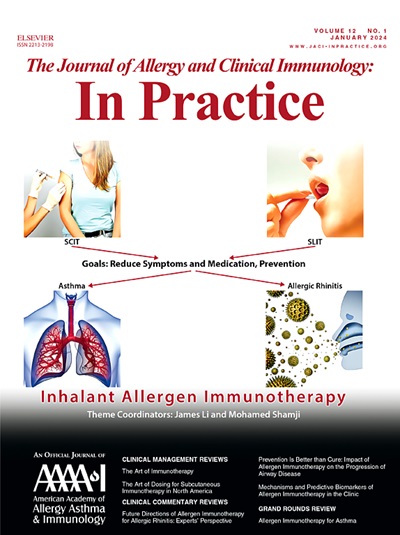Management and Prevention of Hypersensitivity Reactions to Radiocontrast Media: A Consensus Statement From the American College of Radiology and the American Academy of Allergy, Asthma, & Immunology
IF 8.2
1区 医学
Q1 ALLERGY
Journal of Allergy and Clinical Immunology-In Practice
Pub Date : 2025-05-01
DOI:10.1016/j.jaip.2025.01.042
引用次数: 0
Abstract
Intravenous iodinated contrast media (ICM) is widely used in the United States, and it is imperative to provide guidance on the management of adverse reactions to ICM as well as the preparation, planning, and potential premedication for patients with previous reactions. Currently there is a discordance between the American College of Radiology Contrast Manual, which recommends premedication to prevent repeat hypersensitivity reactions to ICM, and the Anaphylaxis 2020 Practice Parameters Update, which recommends against routine administration of glucocorticoids and/or antihistamines to prevent anaphylaxis with prior ICM hypersensitivity reactions. A task force of experts from radiology who are also members of the American College of Radiology Committee on Drugs and Contrast Media and expert allergists/immunologists including members of the Adverse Reactions to Drugs, Biologics and Latex Committee of American Academy of Allergy, Asthma & Immunology evaluated the scientific evidence to develop consensus recommendations that are endorsed by both organizations. The task force took into account the strength of evidence and balanced the potential risks of recurrent reactions with those of premedication and product avoidance when making these recommendations to improve and standardize the care of patients who experience or have a history of reaction to ICM.
管理和预防对造影剂的超敏反应:来自美国放射学会和美国过敏、哮喘和免疫学学会的共识声明
静脉碘化造影剂(ICM)在美国被广泛使用,对ICM不良反应的管理以及有不良反应的患者的准备、计划和可能的预用药提供指导是非常必要的。目前,美国放射学会对比手册和过敏反应2020实践参数更新之间存在不一致,前者建议预先用药以防止ICM的重复超敏反应,后者建议不常规使用糖皮质激素和/或抗组胺药来预防已有ICM超敏反应的过敏反应。一个由放射学专家组成的工作组,他们是美国放射学会药物和造影剂委员会的成员,也是过敏症专家/免疫学家,包括美国过敏、哮喘学会药物、生物制品和乳胶不良反应委员会的成员;免疫学对科学证据进行了评估,以形成两个组织认可的共识建议。在提出这些建议以改善和规范对有ICM反应史或有ICM反应史的患者的护理时,工作组考虑了证据的强度,并平衡了复发反应的潜在风险与用药前和产品避免的潜在风险。
本文章由计算机程序翻译,如有差异,请以英文原文为准。
求助全文
约1分钟内获得全文
求助全文
来源期刊

Journal of Allergy and Clinical Immunology-In Practice
ALLERGYIMMUNOLOGY-IMMUNOLOGY
CiteScore
11.10
自引率
9.60%
发文量
683
审稿时长
50 days
期刊介绍:
JACI: In Practice is an official publication of the American Academy of Allergy, Asthma & Immunology (AAAAI). It is a companion title to The Journal of Allergy and Clinical Immunology, and it aims to provide timely clinical papers, case reports, and management recommendations to clinical allergists and other physicians dealing with allergic and immunologic diseases in their practice. The mission of JACI: In Practice is to offer valid and impactful information that supports evidence-based clinical decisions in the diagnosis and management of asthma, allergies, immunologic conditions, and related diseases.
This journal publishes articles on various conditions treated by allergist-immunologists, including food allergy, respiratory disorders (such as asthma, rhinitis, nasal polyps, sinusitis, cough, ABPA, and hypersensitivity pneumonitis), drug allergy, insect sting allergy, anaphylaxis, dermatologic disorders (such as atopic dermatitis, contact dermatitis, urticaria, angioedema, and HAE), immunodeficiency, autoinflammatory syndromes, eosinophilic disorders, and mast cell disorders.
The focus of the journal is on providing cutting-edge clinical information that practitioners can use in their everyday practice or to acquire new knowledge and skills for the benefit of their patients. However, mechanistic or translational studies without immediate or near future clinical relevance, as well as animal studies, are not within the scope of the journal.
 求助内容:
求助内容: 应助结果提醒方式:
应助结果提醒方式:


